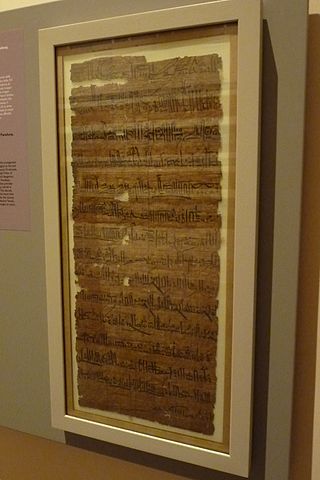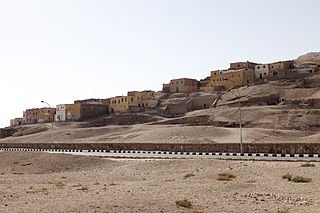Amenhotep is an ancient Egyptian name. Its Greek version is Amenophis (Ἀμένωφις). Its notable bearers were:
Thutmose is an Anglicization of the Ancient Egyptian personal name dhwty-ms, usually translated as "Born of the god Thoth".

Amenhotep II was the seventh pharaoh of the Eighteenth Dynasty of Egypt. Amenhotep inherited a vast kingdom from his father Thutmose III, and held it by means of a few military campaigns in Syria; however, he fought much less than his father, and his reign saw the effective cessation of hostilities between Egypt and Mitanni, the major kingdoms vying for power in Syria. His reign is usually dated from 1427 to 1401 BC. His consort was Tiaa, who was barred from any prestige until Amenhotep's son, Thutmose IV, came into power.

Menmaatre Ramesses XI reigned from 1107 BC to 1078 BC or 1077 BC and was the tenth and final pharaoh of the Twentieth Dynasty of Egypt and as such, was the last king of the New Kingdom period. He ruled Egypt for at least 29 years although some Egyptologists think he could have ruled for as long as 30. The latter figure would be up to 2 years beyond this king's highest known date of Year 10 of the Whm Mswt era or Year 28 of his reign. One scholar, Ad Thijs, has suggested that Ramesses XI could even have reigned as long as 33 years.

Piankh was a High Priest of Amun during the 21st Dynasty.

Pinehesy, Panehesy or Panehasy, depending on the transliteration, was Viceroy of Kush during the reign of Ramesses XI, the last king of the Egyptian 20th Dynasty.

Qurnet Murai is a necropolis located on the West Bank of the Nile at Thebes, Egypt, just to the south of Sheikh Abd el-Qurna.
Amenemope, also Amenemopet, Amenemipet or Amunemopet(ỉmn-m-ỉp3.t, Greek: αμενωφις; “Amun in Luxor”) is an Ancient Egyptian name. Its notable bearers were:

The temples of Wadi es-Sebua, is a pair of New Kingdom Egyptian temples, including one speos temple constructed by the 19th Dynasty Pharaoh Ramesses II, in Lower Nubia.
Seti or Suti was an ancient Egyptian soldier during the late 18th Dynasty, the commander of the army, later mentioned as vizier on monuments of his son, Pharaoh Ramesses I.

Merymose, also Mermose or Merimes, was a Viceroy of Kush under Amenhotep III. He served for almost the entire four decades of that reign.
Huy was Viceroy of Kush during the reign of Ramesses II. He may have served either before or after Setau. Huy was also Mayor of Tjarw and a royal messenger to the Hatti.
Paser I was the Viceroy of Kush during the reigns of Ay and likely Horemheb. Reisner mentions that the only datable inscriptions for Paser belong to the reign of Ay. The next known Viceroy however is Amenemopet, who is dated to the reign of Seti I. Hence it's possible that Paser I served during the reigns of Ay, Horemheb.

The High Priest of Ptah was sometimes referred to as "the Greatest of the Directors of Craftsmanship". This title refers to Ptah as the patron god of the craftsmen.

Amenhotep was the High Priest of Amun towards the end of the Twentieth Dynasty of Egypt, serving under Ramesses IX, Ramesses X and Ramesses XI. He was the son of Ramessesnakht, the previous high priest of Amun. It is not beyond dispute who succeeded him in office. For a long time it was assumed that he was followed by the High Priest Herihor. However, Karl Jansen-Winkeln has suggested that Amenhotep was instead succeeded by the High Priest Piankh. We know the names of several of his brothers and a sister:

The Eighteenth Dynasty of Egypt is classified as the first dynasty of the New Kingdom of Egypt, the era in which ancient Egypt achieved the peak of its power. The Eighteenth Dynasty spanned the period from 1550/1549 to 1292 BC. This dynasty is also known as the Thutmosid Dynasty for the four pharaohs named Thutmose.
This page list topics related to ancient Egypt.

The Theban Tomb TT383 is located in Qurnet Murai, part of the Theban Necropolis, on the west bank of the Nile, opposite to Luxor. It is the burial place of the ancient Egyptian Viceroy of Kush named Merymose, who lived during the 18th Dynasty and served under Amenhotep III.

Taemwadjsy was an Ancient Egyptian woman living at the end of the 18th Dynasty.
New Amada is a promontory located near Aswan in Egypt.
This page is based on this
Wikipedia article Text is available under the
CC BY-SA 4.0 license; additional terms may apply.
Images, videos and audio are available under their respective licenses.











